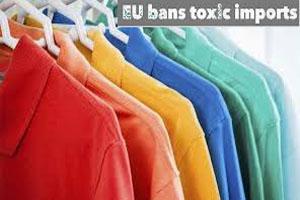
Textiles produced with toxic chemical ban from entering the EU market
YarnsandFibers News Bureau 2015-07-22 13:00:00 – EuropeEuropean countries voted unanimously to extend the existing ban on nonylphenol ethoxylates (NPE) to imports because it poses “unacceptable risk†to aquatic wildlife. The use of NPE in the textile industry is made for cleaning, dyeing and rinsing agent in the processing of fabrics.
The use of NPE in the textile industry has been restricted in the EU for 10 years, but the new measures will also ban the import of goods containing the chemical.
The new ban stipulates that items will not be permitted to enter the EU for sale that contain NPE in concentrations equal to or greater than 0.01% by weight of the textile article. The term textile article refers to any product which is composed of at least 80% textile fibres by weight.
New restrictions will go into effect five years after the legislation is adopted by the European Commission, which is expected to happen in the next month.
The idea of extending the ban first arose in Sweden after the European Chemicals Agency (ECHA) released research in 2013 showing the chemical to be a threat.
When NPE degrades it produces substances such as nonylphenol, which accumulates in the bodies of fish and affects their hormones, disrupting the reproduction and growth of species, the Guardian reported.
Greenpeace released a study in 2011 that showed high-profile companies such as Adidas, H&M, Lacoste, and Ralph Lauren sold clothing manufactured with NPE. Over 75 percent of tested clothes contained the chemical, at least in small amounts.
Clothing and textile companies have complained that compliance with the ban will be difficult to achieve, as NPE is ubiquitous in the supply chain.
The ban will not impact secondhand or recycled goods, as they are believed to have been washed numerous times, so as to contain negligible amounts of NPE.
Market Intelligence
Ask for free sample Report

experience
Customer Base
dedicated team
Countries Served Worldwide









